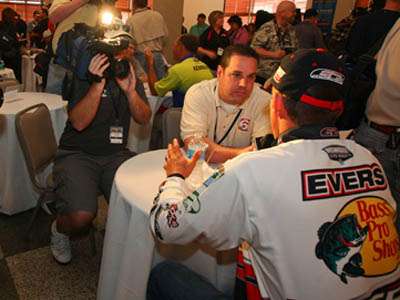
SHREVEPORT, La. — Edwin Evers was the first of the 2012 Bassmaster Classic contestants to go through the food line at Media Day today. He said he’s not superstitious and that his rush had no particular significance, but it was hard not to think that he wanted to set a pattern for the weekend. The line between winning a Classic and being an also-ran is razor-thin, so anglers will do anything in their power to increase the odds.
Evers finished fifth when the Classic was held here in 2009, but believes he should’ve taken the crown that was eventually claimed by Skeet Reese.
“I had the bites to win,” he said. “The one that even hurts more is last year. I knew it would be won in Catouatche, but I drove all the way down (to Venice) like a cow to the slaughter. I caught my five fish and immediately drove back, but by the time I got up there I wasn’t free to roam.”
The near misses are more painful than the absolute bombs, he added, because even though the resulting check is bigger, the pain is deeper and lasts longer.
Other anglers who’ve flirted with Classic victory only to come up short all agree that an “almost” can be debilitating.
Mike Iaconelli finished second here in the 2009 world championship, coming up short of Reese’s total by a mere 11 ounces.
“What I learned from that is that you can’t get discouraged,” he said. “I almost won it in the last couple of casts of the day. Last time the weights went up from 10 or 11 o’clock until we went in, so it’s important not to get frustrated.”
Ike added that his penchant for temper tantrums, complete with kicking and the occasional bit of tackle breakage, is actually cathartic for him.
“That’s my way of letting it go,” he said. “For me it’s a positive.”
Of course, Iaconelli has the 2003 Classic trophy in his possession, which may also serve to calm his nerves. Most other members of the runner-up club don’t have that achievement to fall back upon.
Jeff Kriet seemed devastated when he finished second at Lay Lake in 2010 and Aaron Martens has been second when the scales closed on four occasions. Martens was runner-up three times in four years early in the last decade, and then matched that result again last year in New Orleans.
Kriet said there are different sorts of second-place finishes – some you lose and some the other guy wins.
“At Lay I probably fished as perfect a tournament as I ever have,” he said. “I can obviously say that (Kevin VanDam) just beat me. But Hartwell (in 2008) haunts me. I think about it every day. I finished fifth only because of lost fish after lost fish after lost fish.”
At Lay Lake in 2010, Kriet led the event after two days and thought he was in the driver’s seat, but Hurricane KVD had other plans. They both fished in Beeswax Creek, but VanDam was in the back, behind a bridge.
When he emerged on Day Two to run to other spots, he appeared to be in something of a panic mode. On Day Three, he never came out from his cubbyhole, and when Kriet realized that was the case he felt a sinking feeling permeate his stomach.
“It hit me at about 1:30,” he said. “If he’d only had 12 pounds again he wouldn’t have stayed that long.”
For Martens, the most painful of his second-place efforts occurred on the stingy Three Rivers of Pittsburgh in 2005, when he broke off several fish, had others come loose as he reached for them, and bounced one memorable two-pounder off the side of the boat. He ultimately fell short of VanDam by 6 ounces.
That was an improvement over 2004, when he missed the crown by 2-12, and 2002 when he finished second with a 6-4 gap. Last year VanDam bested him by over 10 pounds.
As with Kriet’s finish the year before, it wasn’t so much that Martens lost as that VanDam took over.
“I didn’t have a chance,” Martens said. “That was too much of a deficit to make up. Pittsburgh was much harder on me.”
Martens was careful not to say that finishing second has become easier on his psyche, but he did note that the repeated experience has toughened him up.
“It hardens you,” he said. “You get so you can handle bad things better and that makes the little mishaps off the water a lot easier to deal with.”
Even for those more likely to dwell on missed opportunities, there’s little time for that if an angler is intent on qualifying for next year’s Classic.
“The reality is that we have to be over this one in about two weeks,” Iaconelli said. “You can’t be thinking about a lost fish at the Red River when you’re sitting on a five-pounder at the St. Johns.”

